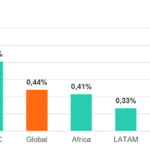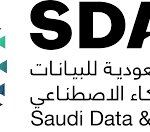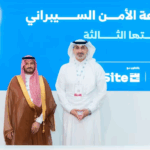We Secure the Middle East with Our Best-of-Breed and Arabic-Ready Solutions

In an interview with a&s Middle East, AMAG Technology’s Mark Williams explores tailored security solutions and innovations for the Middle East region, including the challenges of localisation, unique machine learning technologies, and future trends revolving around frictionless access
a&s Middle East: Can you provide an overview of AMAG Technology’s presence and operations in the Middle Eastern region? How long has the company been active in this market?
Williams: AMAG has been operating in the Middle East region for more than 20 years and has local integrators in Abu Dhabi to service the GCC.
a&s Middle East: What specific challenges and opportunities do you see in the Middle Eastern market for physical access control, identity management, and integrated security solutions?
Williams: Localization can be a challenge for some, but AMAG’s Symmetry solutions are designed to operate in Arabic with a right-to-left orientation of the screens to ensure wider adoption.
a&s Middle East: How does AMAG Technology tailor its solutions to meet the unique security needs and cultural considerations of Middle Eastern clients, particularly in line with your “empowering customers to succeed” concept?
Williams: Apart from the native language operation of our Symmetry Security Management System, we are also aware of cultural sensitivities around who has access to personal images and can hide that in organizations that use our identity management systems. Our goal is to empower security managers and decision-makers to make the choices they need to effectively secure their people, property, and assets, and feel confident in their choice.
a&s Middle East: Could you share some success stories or notable projects in the Middle East where AMAG’s solutions have made a significant impact on enhancing security and access control?
Williams: AMAG has been very successful in both the commercial and central banking verticals in the Middle East. Customers have made use of our BLE-enabled multi-technology card readers to help them transition to more secure encrypted card technology whilst also benefiting from automated on-boarding, off-boarding, and recertification of employees using our web-based Symmetry CONNECT identity management solution which has helped them reduce administration costs and mitigating risk with policy-based automation of access privileges. As highly regulated industries, they have also seen a huge reduction in time and effort to produce their quarterly audit data with real-time management dashboards available.
Localization can be a challenge for some, but AMAG’s Symmetry solutions are designed to operate in Arabic with a right–to–left orientation of the screens to ensure wider adoption
a&s Middle East: Given the geopolitical landscape of the Middle East, are there any regulatory or compliance factors in the Middle East that AMAG takes into account when providing security solutions to clients, such as those relating to data privacy or cybersecurity?
Williams: This question is very on point. With the seemingly endless fascination with cloud-based solutions seen in other parts of the world, the Middle East takes a more nationalistic view to the hosting of data and therefore many of AMAG’s SaaS solutions have been deployed “on-prem” i.e. hosted in the client’s own IT infrastructure to avoid external foreign hosting of their data. At the time of writing, however, we have just setup our first visitor and identity management solution for a customer in the Middle East using our US-hosted Microsoft Azure environment. So perhaps this will see the start of a new trend towards externally hosted solutions.
a&s Middle East: Can you discuss the role of technology partnerships in the Middle East? How does collaborating with local partners contribute to delivering more comprehensive security solutions?
Williams: AMAG systems are open and therefore we quite often have requests for our systems to integrate with local providers of time and attendance solutions, for example. Given that time and attendance solutions are often highly localized, this allows our customers to benefit from “best of breed” products that have been specifically designed to cater to the Middle East market.
a&s Middle East: The Middle East is a fast-growing market with evolving security needs. How does AMAG Technology stay up-to-date with rapid technology advancement and the ever-changing demands of its customers in the Middle East?
Williams: AMAG is a huge proponent of the “voice of the customer” and uses major trade shows like Intersec to listen to the needs of our Middle East customers and make sure that wherever possible those needs are reflected in our product road maps. It also helps that AMAG commits significant R&D resources in both the UK and the US to make sure its hardware and software products remain a
t the forefront of the market.
a&s Middle East: What do you foresee as the future trends in the Middle Eastern security market, and how is AMAG positioned to adapt and lead in those areas?
Williams: We have seen a huge trend toward “frictionless” access control post-COVID. This has extended beyond long-range BLE-enabled readers and smartphones to frictionless biometrics that uses photo images that have either been imported from HR systems or created as “selfies” using mobile credential management solutions. Such technologies may mean the end of the traditional “pass office” or could well see the end of traditional access control cards in favor of smartphones with free mobile credentials or indeed simply presenting one’s face or finger to a device that does not need to be “touched” in any way.

Leveraging Machine Learning to Mitigate Internal Threats
One other trend we see throughout the region is the need to deal with the internal threat i.e. from someone we have already provided with the means to enter our protected properties legitimately. AMAG has pioneered the application of machine learning algorithms to the big data that access control and security management systems possess. AMAG’s Symmetry Analytics system learns a person’s normal behavior after a short period and therefore, by extension, can determine what the person’s abnormal behavior is. This allows Symmetry to provide reports to our customers warning of potentially nefarious activity. The data allow them to be proactive, rather than reactive.




















